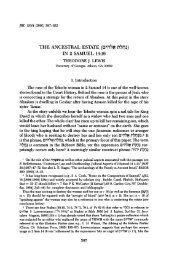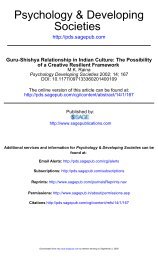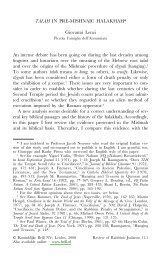Religion, Theology, and Philosophy on the Way to Being and Time ...
Religion, Theology, and Philosophy on the Way to Being and Time ...
Religion, Theology, and Philosophy on the Way to Being and Time ...
Create successful ePaper yourself
Turn your PDF publications into a flip-book with our unique Google optimized e-Paper software.
I. M. Fehér / Research in Phenomenology 39 (2009) 99–131 105<br />
While Heidegger’s remarks <strong>on</strong> phenomenology in his academic writings<br />
scarcely amount <strong>to</strong> more than a faithful recapitulati<strong>on</strong>, expositi<strong>on</strong>, or adherence<br />
<strong>to</strong> its basic tenets, <strong>the</strong> postwar observati<strong>on</strong>s display a tendency <strong>to</strong>ward<br />
a comprehensive c<strong>on</strong>fr<strong>on</strong>tati<strong>on</strong> of its basic c<strong>on</strong>cepts <str<strong>on</strong>g>and</str<strong>on</strong>g> <strong>the</strong>oretical fundaments.<br />
WS 1919/20, bearing <strong>the</strong> title Th e Fundamental Problems of Phenomenology,<br />
begins with <strong>the</strong> following characteristic statement: “For phenomenology,<br />
<strong>the</strong> fundamental problem of phenomenology—its most acute problem, a problem<br />
that can never be extinguished, its most original <str<strong>on</strong>g>and</str<strong>on</strong>g> decisive problem—is<br />
phenomenology itself.” 9 Phenomenology should, for Heidegger, not just occasi<strong>on</strong>ally<br />
be c<strong>on</strong>cerned with itself. On <strong>the</strong> c<strong>on</strong>trary: if it is <strong>to</strong> be radical enough,<br />
it should bring <strong>to</strong> bear its criticism also up<strong>on</strong> itself—indeed, primarily against<br />
itself (see GA 58: 6, 145, 237).<br />
Heideggger heartily welcomed <strong>the</strong> innermost eff ort of phenomenology, <strong>the</strong><br />
proclamati<strong>on</strong> of returning <strong>to</strong> “<strong>the</strong> things <strong>the</strong>mselves” as well as what it implied:<br />
<strong>the</strong> suspending of traditi<strong>on</strong>al philosophical strategies, <strong>the</strong> dismissal of <strong>the</strong><br />
authorities, <strong>the</strong> preference of descripti<strong>on</strong> over c<strong>on</strong>structi<strong>on</strong>, in short: <strong>the</strong> eff ort<br />
<strong>to</strong> bring out <strong>the</strong> phenomena by going back <strong>to</strong> <strong>the</strong> original sources of intuiti<strong>on</strong><br />
c<strong>on</strong>ceived of in terms of <strong>the</strong> <strong>on</strong>ly legitimizing instance for philosophical statements<br />
<str<strong>on</strong>g>and</str<strong>on</strong>g> <strong>the</strong>ories. Indeed, phenomenology, thus c<strong>on</strong>ceived, became for<br />
Heidegger identical with philosophy. From <strong>the</strong> earliest postwar period up <strong>to</strong><br />
his latest years he repeatedly maintained that phenomenology was not just a<br />
philosophical “trend,” <strong>on</strong>e “st<str<strong>on</strong>g>and</str<strong>on</strong>g>point” am<strong>on</strong>g many possible o<strong>the</strong>rs, but was<br />
equivalent with <strong>the</strong> innermost possibility of philosophy itself. 10 It is important<br />
<strong>to</strong> see that phenomenology, for Heidegger, was a possibility ra<strong>the</strong>r than an<br />
actuality, that he <strong>the</strong>reby sharply distinguished between phenomenology as a<br />
way of doing philosophical research <str<strong>on</strong>g>and</str<strong>on</strong>g> phenomenology as this particular<br />
research became c<strong>on</strong>cretized in <strong>the</strong> form Husserl gave it in his work. Th is is<br />
<strong>on</strong>e of <strong>the</strong> reas<strong>on</strong>s why he claimed in <strong>Being</strong> <str<strong>on</strong>g>and</str<strong>on</strong>g> <strong>Time</strong>: “Higher than actuality<br />
st<str<strong>on</strong>g>and</str<strong>on</strong>g>s possibility. We can underst<str<strong>on</strong>g>and</str<strong>on</strong>g> phenomenology <strong>on</strong>ly by seizing up<strong>on</strong> it as<br />
a possibility.” 11<br />
9) GA 58: 1. See also GA 9: 36.<br />
10) See GA 56/57: 110; GA 61: 187; GA 63: 72; “Phänomenologische Interpretati<strong>on</strong>en zu Aris<strong>to</strong>teles<br />
(Anzeige der hermeneutischen Situati<strong>on</strong>),” ed. H.-U. Lessing, in vol. 6 of Dil<strong>the</strong>y Jahrbuch<br />
für Philosophie und Geschichte der Geisteswissenschaften, ed. F. Rodi (Göttingen: V<str<strong>on</strong>g>and</str<strong>on</strong>g>enhoeck &<br />
Ruprecht, 1989), 247 (hereafter: PIA); GA 20: 184; GA 21: 32, 279f.; SZ 38; GA 24: 3;<br />
GA 29/30: 534; US 95; Zur Sache des Denkens, 2nd ed. (Tübingen: Max Niemeyer, 1976; hereafter:<br />
SD) 90.<br />
11) Sein und Zeit, 15th ed. (Tübingen: Niemeyer, 1979), 38, hereafter SZ. Italics in original. See<br />
already in <strong>the</strong> early lecture courses, e.g., GA 63: 107; GA 17: 263.







